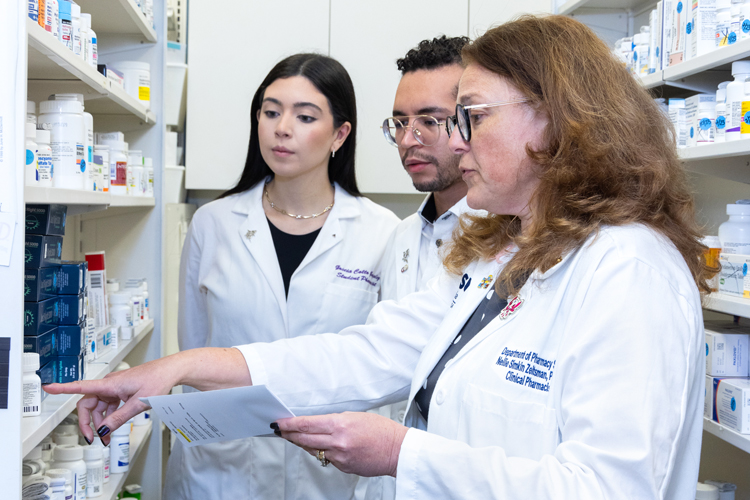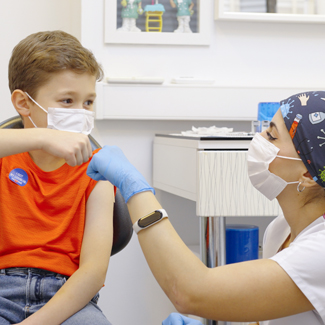Launch your rewarding pharmacy career at Nova Southeastern University's Barry and Judy Silverman College of Pharmacy. Our Doctor of Pharmacy (Pharm.D.) program will equip you with the knowledge, skills, and experience you need to excel in the ever-evolving field of pharmacy. As a Pharm.D. student, you'll engage in patient-centered care techniques, leadership training, and real-world clinical practice while developing career-advancing relationships amidst NSU’s health care teams.
Our curriculum uses advanced interactive teaching, delivery, and assessment methods. As an NSU Silverman College of Pharmacy student, you'll also have opportunities to participate in international trips and research opportunities that broaden your perspective. Upon completion of this program, you'll be prepared to become a successful practicing pharmacist in a dynamic and evolving health care environment.
Quick Facts
Shark Sightings
Every student has a story. The “Shark Sightings” video series highlights undergraduates, graduate students, and NSU alumni who are diving into their coursework, getting involved in extracurriculars, and using their education to make a difference in their chosen fields.
Learn why each Shark says they chose NSU, and how their degree is preparing them to dominate.
Double Your Impact: Explore Concurrent Degree Options
You can apply to complete a concurrent degree after successful completion of first-year
pharmacy coursework. Requirements and processes will vary based on the program’s college
of origin, but can unlock incredible opportunities for any Pharm.D. student.
Explore our concurrent degree options below.
Pharm.D. / Master of Public Health (M.P.H.)
Learn More About the M.P.H. ProgramPharm.D. / M.S. in Health Informatics
Learn More About the Health Informatics ProgramCurriculum
The courses are representative of the overall requirements of the program at the time of publication, and are subject to change. The curriculum is revised, as needed, to meet the demands of the profession.
Pharm.D. Curriculum Educational Outcomes (PDF)
Curriculum
CRN
Credits
Curriculum
CRN
Credits
Curriculum
CRN
Credits
Curriculum
CRN
Credits
Total Curriculum Hours: 159
IPPE = Introductory Pharmacy Practice ExperienceAPPE = Advanced Pharmacy Practice Experience
The curriculum prepares students for practice and to take the North American Pharmacist Licensure Examination® (NAPLEX®), and Multistate Pharmacy Jurisprudence Examination® (MPJE®), components of the licensure process to practice as a pharmacist.

Gain Real-World Pharmacy Experience
Introductory Pharmacy Practice Experiences (IPPEs) give you hands-on learning in community and hospital settings. You'll integrate knowledge from classes and labs while exploring the role of a clinical pharmacist and honing your communication skills. Successful completion of IPPEs unlocks the next level of your journey: Advanced Pharmacy Practice Experiences (APPEs).
During APPEs, you'll:
- Spend six weeks immersing yourself in a supervised pharmacy practice environment.
- Apply what you've learned in the classroom to real-life patient care scenarios.
- Develop essential competencies like interprofessional collaboration and evidence-based medicine.
- Enhance your communication and patient education skills.
Get In Touch with an Experiential Education Director
For currently enrolled students only. For prospective students, please refer to the Admissions webpage.
Jennifer Steinberg Hernandez, Pharm.D.
Director, Experiential Education, Assistant Professor
Introductory Pharmacy Practice Experience (IPPE)
Fort Lauderdale/Davie
Stella Athanas, Pharm.D
Director, Experiential Education/Assistant Professor
Advanced Pharmacy Practice Experience (APPE)
Fort Lauderdale/Davie
Julie Marin, Pharm.D.
Director, Experiential Education, Assistant Professor
Introductory and Advanced Pharmacy Practice Experiences (IPPEs/APPEs)
Puerto Rico Regional Campus
Denise T. Elia, Pharm.D.
Director, Preceptor Development/Assistant Professor Experiential Education
Fort Lauderdale/Davie Campus




